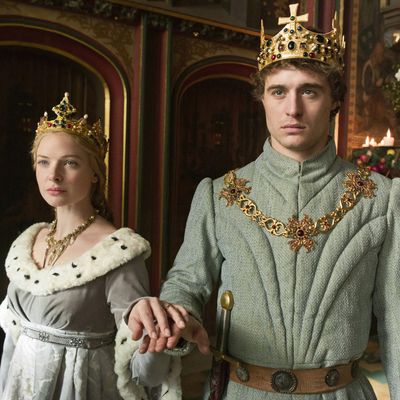
The medieval world depicted in HBOÔÇÖs Game of Thrones is decidedly not of this Earth┬áÔÇö um, dragons! ÔÇö but it does find real worldÔÇôinspiration for many of its battles, mad monarchs, and palace intrigue in the War of the Roses, the dynastic fight for the throne of England that occurred in the mid- to late-1400s. Accordingly, any TV show about the War of the Roses is bound to bear some similarities to Game of Thrones, right? StarzÔÇÖs latest drama, The White Queen, is based on Philippa GregoryÔÇÖs historical novels and is so similar to Game of Thrones that it might even help fill the void for anyone who just canÔÇÖt wait until the fourth season of HBOÔÇÖs epic drama arrives next spring. Consider these connections:
Nightmares in the Snow: The opening scene of the first episode of both series features someone running through a snow-covered forest (in Game of Thrones, to avoid the undead; in The White Queen, an unknown foe). Both are mood pieces that set the stage for events to come ÔÇö in The White QueenÔÇÖs case, itÔÇÖs revealed to be a prophetic dream.
Character Correlations: ItÔÇÖs not always direct in Game of Thrones, as one of George R.R. MartinÔÇÖs characters might share personality traits with a certain historical figure or group, yet a situation or position in common with another. But some people see Cersei from Game of Thrones in The White QueenÔÇÖs Elizabeth Woodville, the commoner Edward IV married; others see her in Margaret of Anjou, the wife of Henry VI (the king Edward IV helped depose) because sheÔÇÖs a commanding woman fiercely devoted to putting her sociopathic son on the throne. Yes, there is a Joffrey predecessor, and his name is Edward of Lancaster, a.k.a. the Prince of Ice. Although these arenÔÇÖt precise match-ups, The White Queen also has a mad king (King Henry VI of Lancaster), as well as an exiled heir to the throne (Henry Tudor). Edward IV, like Robert, also has two brothers vying for the throne. (His brother George, like Renly, doesnÔÇÖt even want to wait for his death, telling him, ÔÇ£I was hoping for your crown.ÔÇØ) Bran and Rickon, meanwhile, are probably the Princes in the Tower.
A King Comes Calling: Kings do make house calls. In the first episode of The White Queen, King Edward IV pays a visit to the household of Baron Rivers, because Elizabeth Woodville and her two sons are crashing with her parents. ItÔÇÖs a large family, even larger than the Starks of Winterfell, who also got a royal visit in the first episode of the first season. Elizabeth is especially close with her brother Anthony (although without the incest).
Robert Pugh: Whether heÔÇÖs playing the crude Craster of CrasterÔÇÖs Keep in Game of Thrones or the more noble Baron Rivers in┬áThe White Queen, Pugh always seems to portray a man who loves his daughters. As Elizabeth WoodvilleÔÇÖs father, he is protective and supportive, which probably means heÔÇÖs not long for this world. (And thatÔÇÖs another way this show is like Game of Thrones: Major characters die, and often. Expect a bloodbath in episode five.)
A Secret Marriage: Remember Robb StarkÔÇÖs impetuous marriage to someone from a lesser house allied to his enemy, a woman he was attracted to rather than the Frey girl he was supposed to wed? ThatÔÇÖs just like King Edward IVÔÇÖs ÔÇ£privateÔÇØ wedding with Elizabeth Woodville. His advisor wanted him to marry a French bride for the sake of a treaty, and both of the teenage kings in Game of Thrones and The White Queen (who were also great on the battlefield and had fathers killed by Lannisters/Lancasters) went against political advice and faced a betrayal as a result. So you could say that this romance is like Robb StarkÔÇÖs doomed young love. But then as the royal couple gets older in The White Queen, Edward and ElizabethÔÇÖs marriage bears more of a resemblance to that of Robert and Cersei, what with his growing girth and penchant for whoring. Their children are even declared illegitimate at one point, much like the questions surrounding CerseiÔÇÖs kids. (In her case, for good reason!)
Kingmakers, Kingslayers, and Hands of the King: Where thereÔÇÖs a king, thereÔÇÖs also someone who put him on that throne ÔÇö and advises him how to keep it. This is a powerful but dangerous position, as weÔÇÖve learned in Game of Thrones from the deaths of Jon Arryn and Ned Stark. The person holding an equivalent position in The White Queen is the Earl of Warwick, who has both the slippery personality of Littlefinger and the scheming power of Tywin Lannister. Warwick is more concerned with making good marriages for his daughters, which makes him more like Walder Frey. He is quick to betray when humiliated; his advice at one point is, ÔÇ£Be wary. Commit to no one until there is a clear winner, and then remind them of your undying loyalty, until it serves you no more.ÔÇØ The underlying threat of Warwick is that he can make someone a king ÔÇö or unmake them.
Magic: Obviously, there wasnÔÇÖt any actual sorcery to speak of in the War of the Roses, just accusations to undermine political enemies. But in the universe of The White Queen, the magic is real; itÔÇÖs what gives gives Elizabeth and her mother Jacquetta their Melisandre-like skills. They claim to be descended from the river goddess Melusina, and that they can see the future, cast death curses, and cause storms. ÔÇ£Magic is in our blood,ÔÇØ Jacquetta says. Elizabeth just wishes she had some dragons.

